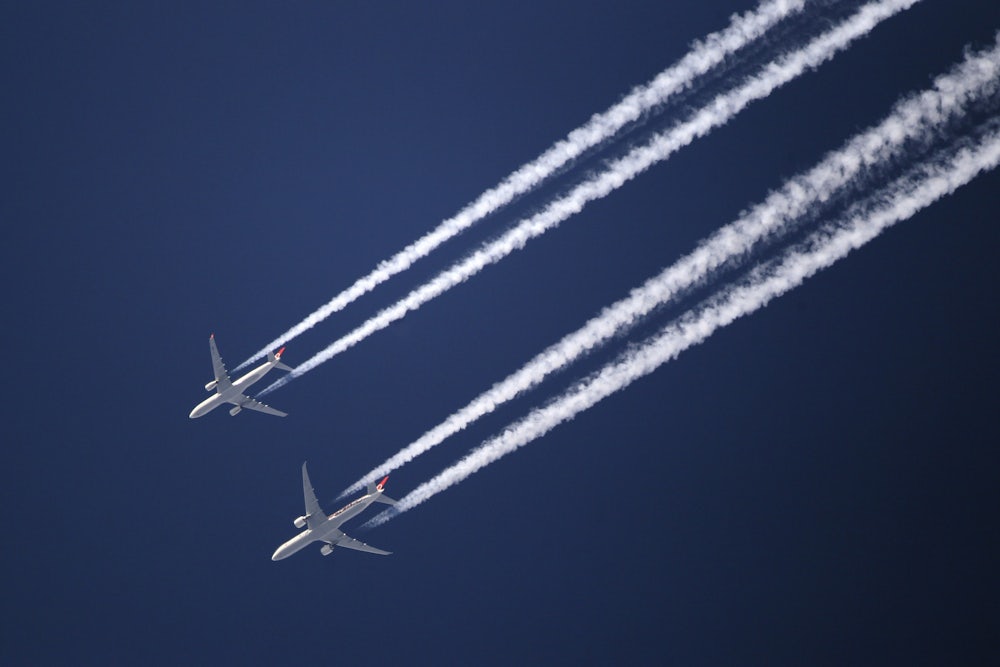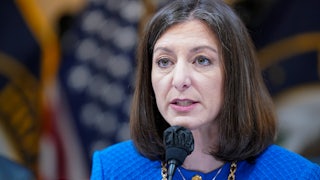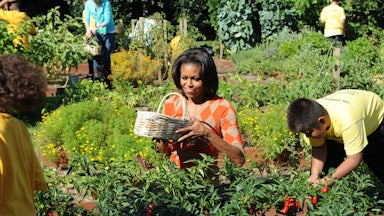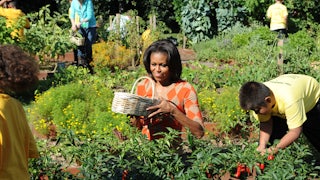Big climate gestures are de rigueur. Some industries are introducing “green” innovations by the day, from the electrification of cars to the upcycling of fashion to more future-oriented finance. Some of these are more substantial than others, of course—meaningless press releases abound. But in recent weeks, progress has come from a particularly surprising source: aviation.
Environmental campaigners have for years rightly singled out plane travel as one of the biggest climate offenders. Aviation contributes about 3 percent of all carbon emissions worldwide, which would make it sixth in the world if it were a country. The airline industry’s contribution to the climate problem is worse than that, however, if we consider that flight also produces pollution other than carbon. The water vapor and cirrus clouds that planes trail behind them look picturesque, but their warming impact is three times that of carbon. And although the clouds themselves evanesce quickly, their cumulative effect is powerful, exceeding that of the airline industry’s carbon emissions. This means that every stat you read about the carbon emissions of air travel vastly undercounts its actual impact on our atmosphere.
Taking this to heart, many of us have ceased or dramatically curtailed our personal travel and some companies have taken steps to cut down on business travel. In recent years the slightly comical phrase “flight-shaming” has entered the culture: the practice of reprimanding people for unnecessary air travel because of the climate impact.
The aviation industry has been disgracefully slow to embrace reform, and ridiculously uninterested in policing itself. In May the U.K. climate advocacy group Possible published a study showing that over the past two decades, airlines had missed all but one of their 50 targets for emissions reduction.
Yet in one of the year’s biggest surprises, we finally have some good news on this front. Part of that came from the passage of the Inflation Reduction Act, which included tax credits to help the aviation industry meet the commendably aggressive targets set by the Biden administration. Better yet, a new report finds that sustainable aviation fuels, or SAFs, made from household waste, algae, and other ingredients, can dramatically cut emissions in the industry. Aviation fuels are one of the trickiest substances to render truly sustainable at economically feasible prices. But one of the encouraging findings in the new report is that the SAFs can be blended with traditional fuels while the industry ramps up production capacity for the SAFs, which right now is lacking. And expanding that capacity could create a lot of good jobs.
The aviation news from Europe is even better, showing the crucial rule of regulation alongside innovation. France got permission from the European Commission to crack down on aviation and is now in the early stages of banning flights between locations that could be reached within a shorter than two-and-a-half hour train trip. (Air France had already stopped operating such flights as a condition of receiving 2020 Covid-19 aid.) The government has begun by banning several popular routes from Paris, and more may be approved as France improves its rail alternatives. France is also moving toward a tax on private jets, which are completely unnecessary and create more than 14 times as much pollution as commercial planes.
Earlier this year the Dutch government announced a goal of reducing flights out of its major national airport by 10 percent. This week, after the European Commission’s announcement about France’s move, the CEO of KLM, a major Dutch airline, said customers should take the train rather than fly, whenever possible, and that her company was working to make it easier to buy train and plane tickets in a single booking in order to cut down on short flights. KLM’s statements are startling; although its accompanying actions are nothing special, they seem to signal that the company could be pressured to do more.
Climate activists sometimes dismiss “technological fixes,” while businesses often claim more regulation isn’t necessary. But these fresh hints of green in the aviation world show that it’s not either/or. The way to bring down emissions from this highly polluting industry is to do both: regulate it and find brand new ways to fly.
Of course, there is much more to be done. All governments should ban short flights and improve train service to compensate. The airlines must abolish frequent flier programs, which encourage people to fly more; if they don’t, governments must either ban such programs or make them costly. Another solution is the frequent flyer levy, an economically progressive idea advanced by the International Council on Clean Transportation, which argues that taxing consumers based on how often they fly during a year would provide incentives to fly less often without pricing low-income consumers out of air travel. Better yet, the rich need to be taxed out of existence; they fly far more than anyone else and of course account for almost all private jet travel. One percent of people account for half the world’s carbon emissions from plane travel, while less than 20 percent of the global population has ever taken a plane. The rich need to be deprived of the means of pollution.
Under present circumstances, the best aviation policy for the planet would be a total ban on international air travel for at least a few years. But given that so many families and friendships are transnational, the importance of international cooperation and collegiality in so many fields of human endeavor, and the pleasure of going places we’ve never been, it would be even better—not to mention more politically palatable—if there was another way. All the recent news suggests there might be.






